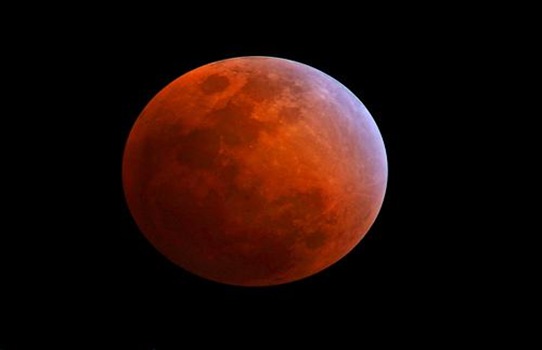I didn’t set my alarm, but I was awake a little after 3 a.m. this morning anyway. I knew it was chilly outside (I’m here in the Washington DC area for the winter break), but I was enticed out of bed and into down jacket, scarf, hat, gloves, and UGGs by what I might see outside: a total lunar eclipse taking place on the night of the winter solstice.
Wow.
The night was crystal clear and about as full of stars as light pollution allows. And the Moon….
Did I already say “wow”?
The eclipse was in the “totality” phase (I learned the lingo just yesterday), which means that the entire moon was in the shadow of the Earth. It was clearly a full moon but shone a dull coppery color, like a faraway penny.

Totality Phase
Sometime near 4 a.m. an arc of light appeared across the top and slowly spread downward.

Emerging-from-Totality Phase
Marvelous.
* * *
Laws and law. The laws of nature that allow us to predict astronomical events such as a total lunar eclipse on the night of the winter solstice for the first time in centuries with precision and certainty seem far removed from the contingent, ephemeral law of humans. My first thought was that it is presumptuous to even use the same word to describe them.
But when I googled “laws of nature” and ended up in the middle of an issue in contemporary philosophy, I realized that there is actually more similarity than I would have thought.
(Full disclosure here: My only formal philosophical training consisted of a journey through a paperback copy of Will Durant’s The Story of Philosophy in a Humanities survey class in 11th grade.)
A significant question in modern philosophy appears to be whether the laws of nature are prescriptive or descriptive. The question, according to science writer Dennis Overbye (“Laws of Nature, Source Unknown,” NY Times, 12/18/07): “Do they govern nature or just describe it?”
In cosmology, says Overbye, this question raises “a kind of chicken-and-egg problem with the universe and its laws. Which ‘came’ first—the laws or the universe?”
If the laws came first (prescriptive), then there may be only one universe; if our particular laws evolved along with our particular universe, then there may be other “multiverses” with other laws.
This takes us far beyond Einstein.
But when you think about it, these questions bear a striking resemblance to some of the fundamental questions we have about human law.
What is the nature of law—prescriptive or descriptive?
(My view is that it is either both or neither.)
Which comes first—the society or the laws that govern/describe it?
(My view is that they continually recreate each other, the laws emerging from the society and the society being molded by the laws.)
Is there a “meta-law” that underlies all the others?
(Some scientists posit string theory as a “theory of everything,” which would make strings the essence of this and other worlds. In law, I keep returning to stories as both overarching and lying at the core.)
* * *
Does all of this matter?
I think that how we see the enterprise of law fundamentally affects how we engage in it.
If we see law as prescribed, we fail to exercise the power of doubt and we cede responsibility—to natural law (as distinguished from the laws of nature) or to the past, real or imagined (think originalism). Whatever happens is someone else’s fault.
But if we see law as described, we are faced with the fact that it is socially constructed, which places responsibility squarely on our shoulders. In that case we cannot place the blame for injustice elsewhere.
So yes, I think it does matter.
* * *
I didn’t see the end of the eclipse; a bank of clouds scudded across the sky. The moon peeped in and out and then disappeared entirely. I went back to bed.
Goodnight, Winter Solstice.
Farewell, 2010.
Thanks to my daughter Elaine Sylvester, a philosophy major at Oberlin College, for reviewing this post…